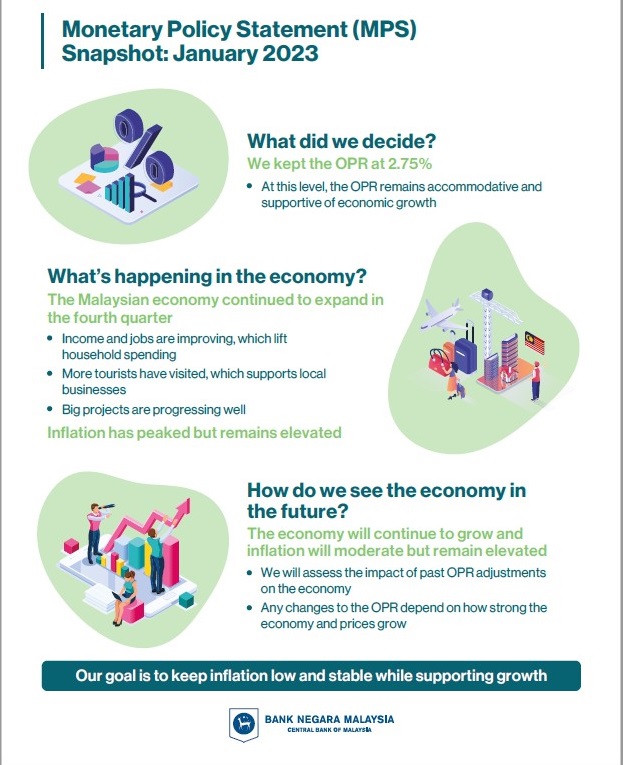
KUALA LUMPUR, Jan 19 – Bank Negara Malaysia will be retaining the Overnight Policy Rate (OPR) at 2.75 percent to continue to accommodate and support economic growth in the company.
The central bank announced this in a statement following a meeting of its Monetary Policy Committee (MPC) today.

“The global economy continues to be weighed down by elevated cost pressures, higher interest rates, and COVID-19-related disruptions in China. These factors more than offset the support from positive labour market conditions, and the full reopening of economies and international borders. Headline inflation moderated slightly from high levels in recent months. However, core inflation remains above historical averages. Central banks are expected to continue raising interest rates, albeit at a slower pace, to manage inflationary pressures.”
Bank Negara said while this will continue to pose headwinds to the global growth outlook, on the other hand, growth in China is expected to improve once the current COVID-19 wave subsides.
Nevertheless it added that the growth outlook will be subject to downside risks, including an escalation of geopolitical tensions, weaker-than-expected growth outturns in major economies, and a sharp tightening in financial market conditions.
For Malaysia, the latest data indicated continued economic expansion in the final quarter of last year on account of resilient domestic demand. As a result, growth for 2022 is expected to exceed the earlier projected range of 6.5 percent to -7.0 percent. Coming off a strong performance in 2022, growth in 2023 is expected to moderate amid a slower global economy. Growth will remain supported by domestic demand. Household spending will be underpinned by sustained improvements in employment and income prospects.
Tourist arrivals have continued to rise, further lifting the tourism-related sectors. The realisation of
multi-year infrastructure projects will support investment activity. Downside risks to the domestic economy continue to stem from a weaker-than-expected global growth, higher risk aversion in global financial markets amid more aggressive monetary policy tightening in major economies, further escalation of geopolitical conflicts, and re-emergence of significant supply chain disruptions.
The central bank said headline inflation averaged 3.4 percent for the period January-November 2022.
As projected, headline inflation peaked in 3Q 2022, while underlying inflation, as measured by core inflation, has averaged 2.9 percent up to November 2022.
“Over the course of 2023, headline and core inflation are expected to moderate but remain at elevated levels amid lingering demand and cost pressures. Existing price controls and fuel subsidies, and the remaining spare capacity in the economy, will continue to partly contain the extent of upward pressures to inflation. The balance of risk to the inflation outlook is tilted to the upside and remains highly subject to any changes to domestic policy on subsidies and price controls, as well as global commodity price developments.”
Today’s decision allows the MPC to assess the impact of the cumulative past OPR adjustments, given the lag effects of monetary policy on the economy, the central bank further said.
At the current OPR level, the stance of monetary policy remains accommodative and supportive of economic growth. Further normalisation to the degree of monetary policy accommodation would be informed by the evolving conditions and their implications to the domestic inflation and growth outlook. The MPC will continue to calibrate the monetary policy settings that balance the risks to domestic inflation and sustainable growth.
–WE